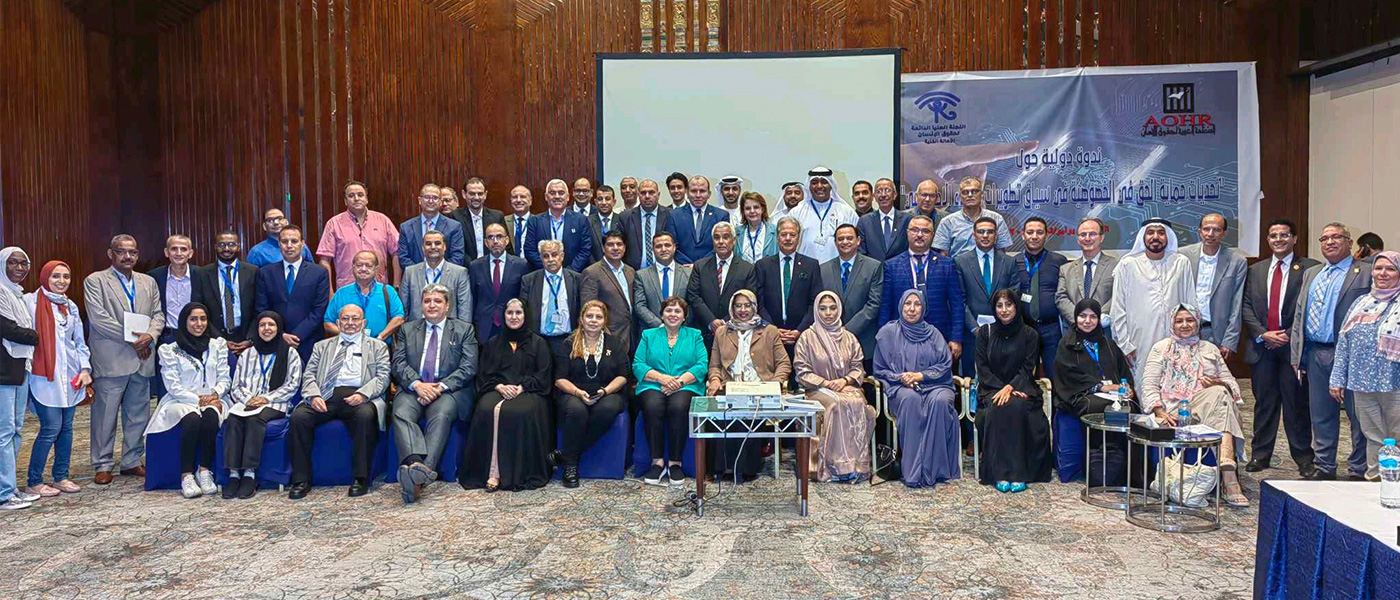- 28July
National Human Rights Institution participates in Challenges to Protect Privacy under Artificial Intelligence Conference

Maqsoud Kruse chairs closing session on Ways to the Future
United Arab Emirates on (...... July 2022)
A delegation from the National Human Rights Institution (NHRI), led by H.E. Maqsood Kruse, Chairperson of the NHRI, participated in the International Conference to Promote the Protection of the Right to Privacy in the Context of Artificial Intelligence Challenges, held in Egypt on July 21-22.
The event was attended by representatives of national human rights institutions, legal experts, communications technology, media and human rights from 23 countries, as well as representatives of executive, legislative and judicial authorities, and leaders of 32 non-governmental human rights organisations in 16 Arab and seven European countries.
The conference, organised by the Arab Organisation for Human Rights and the Standing High Commission on Human Rights in Cairo, addressed the challenges of protecting the right to privacy in light of the developments of artificial intelligence, as one of the most important issues of concern to the human rights movement and jurists around the world, particularly given the significant impact of the telecommunications technology revolution and the developments of artificial intelligence, on protecting the right to privacy, thereby violating private life and ensuring the confidentiality of correspondence.
H.E. Maqsood Kruse, Chairperson of the National Human Rights Institution, chaired the closing session of the conference, which was devoted to discussing the topic of "a public debate on ways to the future", with the participation of Dr. Hassan Badrawi, former Assistant Minister of Justice for Legislation, and Dr. Majid Osman, former Egyptian Minister of Communications.
The session touched on future solutions, perceptions and proposals that can be worked on to address the effects of information and technological development on the protection of the right to privacy, the need to review legislation and establish legal frameworks to ensure the protection of users of communication technology, their data and information and their browsing in full safety, as well as the importance of establishing joint international cooperation between human rights organisations, research and intellectual centers, and relevant institutions, to maintain a secure digital environment.
Kruse said the conference witnessed six panel discussions, focusing primarily on the challenges of realising the right to privacy in the context of technological development, how the breach of the right to privacy affects the activation of other human rights, as well as the legal and social challenges of artificial intelligence, the responsibility of the state and private companies to protect information and data and ensure the right to privacy of citizens, as well as measures to protect privacy in the context of artificial intelligence.
“The negative effects of the misuse of communication technology and artificial intelligence on the right to privacy, by many companies and individuals, have become a major threat to some aspects of fundamental human rights and public freedoms, especially given the superiority of institutional and professional entities in developing and creating what helps them violate the privacy of individuals for various motives, such as marketing and advertising based on disclosure of information and data, analysis of tendencies and patterns of personal and consumer behaviors, as opposed to the weak capacity of individuals,” Kruse said.
He added, “Ordinary people avoid sources of privacy, and expose themselves to violations of the sanctity of private life and the confidentiality of correspondence and interactions.”
“The discussions have not ignored the enormous positives that communication technology and artificial intelligence have achieved and continue to achieve, both in terms of helping them improve the situation of human beings, increasing cultural, scientific and educational development, and in turn bridging the gap of convergence and communication between peoples and cultures, facilitating access to information and access to their sources, helping to spread a culture of human rights among the entire public, and constantly seeking access to the most marginalised groups in society, ending with their capabilities. "There is no limit to exposing illegal practices such as corruption, the culture of exclusion, and the speed of access for perpetrators to achieve successful justice," he said.
Kruse added, "There must be community agreement to address the effects of the rapid development of communications technology and artificial intelligence on the right to privacy, by unifying legislative efforts, and defining the responsibilities of states, private sector institutions, civil society organisations and individuals, to ensure the protection of human rights in the context of the use of artificial intelligence.”
Following the conference, the National Human Rights Institution took part in the capacity of an observer in the 11th meeting of the regular session of the General Assembly of the Arab Human Rights Organisation, which was held in Cairo on July 23-24 to review the literary and financial reports of the organisation's outgoing Board of Trustees (November 2018 to July 2022), and to hold elections by direct secret ballot to elect 20 members of the new Board of Trustees from 26 candidates.